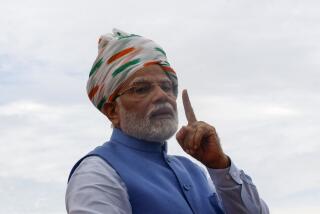India rocked by mobile license scandal
- Share via
Reporting from New Delhi — While the world frets over the WikiLeaks revelations, India is far more interested in Raja, Radia and Dutt. They are major players in a series of homegrown leaks that hint at widespread and corrosive corruption involving government, big business and the news media.
Former Telecommunications Minister Andimuthu Raja, corporate publicist Nira Radia and TV news personality Barkha Dutt are named in 104 telephone calls caught on tape, part of what’s been called India’s biggest scandal since independence.
On Wednesday, Raja’s home and those of four former subordinates were raided. Later in the day, India’s Supreme Court called for setting up a special court to handle the mounting scandal. Newspapers have trumpeted the story for weeks, talk shows have debated little else and Parliament has been in political stalemate since early November over the issue.
The big-money element of the scandal dates to 2008, when India auctioned off licenses for second-generation, or 2G, mobile phone service. Except the licenses weren’t really auctioned. According to an auditor’s report, Raja changed the deadline on short notice, allegedly letting favored companies get licenses to operate across India, for which they paid the government $340 million.
That may sound like a large sum. But for mobile licenses in a booming market — India has 550 million cellphone subscribers, a near doubling since early 2008 — it is chump change. One winning bidder reportedly turned around and sold half of its 2G spectrum for $900 million, even before signing a single subscriber.
When third-generation, or 3G, licenses were awarded this year at far higher amounts per subscriber, the scandal over the previous licenses hit headlines.
“It’s absolutely, very, very clear Raja was taking bribes,” said Prashant Bhushan, a lawyer who has filed a public interest petition in the Supreme Court over the telecom scandal. “These are licenses worth billions of dollars.”
By some calculations, the Indian government lost $38 billion, equivalent to its annual defense budget. Or three times its yearly education budget. Or enough to feed the poorest 10% of the population for a year.
In a country long inured to corruption scandals, however, the most salacious development has been the release last month in the Supreme Court of transcripts of the tapes, whose origin is still unclear. They detail publicist Radia conversing with journalists, politicians and corporate executives.
Shocking to many here was just how much lobbying, which is officially illegal in India, has become a fact of life. The tapes hint at influence peddling among Raja, Radia’s corporate heavyweight clients Reliance and Tata, and politicians in the ruling coalition. Radia is also heard pressuring two prominent journalists — Dutt and Hindustan Times columnist Vir Sanghvi — to serve her clients’ purported interests.
“The real danger, as the Radia tapes show, is that the country is completely in the grips of a few large corporations using fixers to manage everything, including government ministers, parliamentary discussions, the media,” Bhushan said. In effect, “the country becomes no more than a banana republic.”
The former telecom minister, since dubbed “spectrum Raja” by the news media, was forced to resign last month. Radia has stayed largely out of sight. Sanghvi has “taken a break” from writing his column.
Raja has told reporters he was only following recommendations under the 1999 telecom law. Dutt and Sanghvi have denied any conflict of interest and said they were never asked to lobby for the then-telecom minister.
The scandals have raised questions and much hand-wringing among newspaper columnists about the cost of corruption for a nation trying to attain superpower status. They follow alleged malfeasance in the lead-up to October’s Commonwealth Games in New Delhi, which saw a newly built pedestrian bridge collapse and the final budget come in at 30 times original projections. A corruption investigation is ongoing.
The scandals are fed in part by a structural problem, said T. R. Raghunandan, a retired senior government official of 26 years. Senior leaders set the tone for lower officials all the way down the ranks, he said.
Four months ago, Raghunandan helped start a website called IPaidABribe.Com that invites citizens to share their stories about paying bribes for everything from driver’s licenses and passports to traffic violations and land registration. It also includes comments from those who successfully resisted.
Raghunandan, who has seen scandals come and go, said he can predict the future of the latest one.
“The usual thing is to set up a commission made up of recycled bureaucrats,” he said. “They’re well past their use-by date. I need to see charge sheets, prosecutions, someone still in jail two years from now. Otherwise it’s the same old scenario.”
Anshul Rana in The Times’ New Delhi Bureau contributed to this report.
More to Read
Sign up for Essential California
The most important California stories and recommendations in your inbox every morning.
You may occasionally receive promotional content from the Los Angeles Times.












